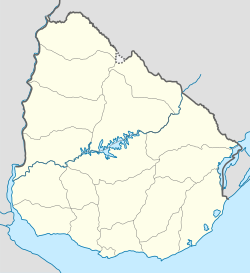Colonia de Sacramento
| Colonia del Sacramento | |
|---|---|
| Capital city | |

|
|
| Coordinates: 34°28′17″S 57°50′39″W / 34.47139°S 57.84417°WCoordinates: 34°28′17″S 57°50′39″W / 34.47139°S 57.84417°W | |
| Country |
|
| Department | Colonia |
| Founded | 1680 |
| Founded by | Manuel Lobo |
| Elevation | 27 m (89 ft) |
| Population (2011) | |
| • Total | 26,231 |
| Time zone | UTC -3 |
| Postal code | 70000 |
| Dial plan | +598 452 (+5 digits) |
| Climate | Cfa |
| Historic Quarter of the City of Colonia del Sacramento | |
|---|---|
| Name as inscribed on the World Heritage List | |
| Location | Uruguay |
| Type | Cultural |
| Criteria | iv |
| Reference | 747 |
| UNESCO region | Latin America and the Caribbean |
| Inscription history | |
| Inscription | 1995 (19th Session) |
Colonia del Sacramento (Spanish pronunciation: [koˈlonja ðel sakɾaˈmento]; formerly the Portuguese Colónia do Sacramento) is a city in southwestern Uruguay, by the Río de la Plata, facing Buenos Aires, Argentina. It is one of the oldest towns in Uruguay and capital of the Colonia Department. It has a population of around 27,000.
It is renowned for its historic quarter, a UNESCO World Heritage Site. Modern Colonia del Sacramento produces textiles and has a free trade zone, in addition to a polytechnic centre and various government buildings.
Founded in January 1680 by Portugal as Colónia do Sacramento, the colony was later disputed by the Spanish who settled on the opposite bank of the river at Buenos Aires. The colony was conquered by José de Garro in 1680, but returned to Portugal the next year. It was conquered again by the Spanish in March 1705 after a siege of five months, but given back in the Treaty of Utrecht. Another attack during the Spanish-Portuguese War, 1735-1737, failed.
It kept changing hands from crown to crown due to treaties such as the Treaty of Madrid in 1750 and the Treaty of San Ildefonso in 1777, until it remained with the Spanish. It then transferred to Portuguese control again, being later incorporated into Brazil after 1816, when the entire Banda Oriental (Uruguay) was seized by the government of the United Kingdom of Portugal, Brazil and the Algarves and renamed the Cisplatina province.
...
Wikipedia

